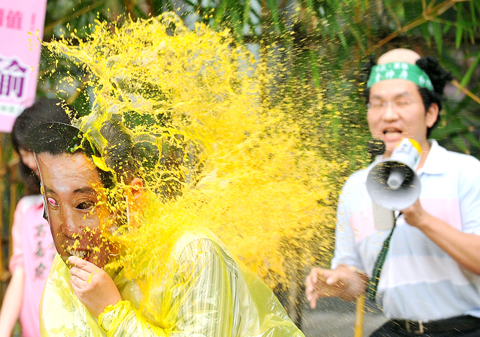Blood serum and plasma imported from China will not be used for the purpose of transfusions in Taiwan, the Department of Health (DOH) assured the public on Friday. The announcement was made in response to lawmakers’ concerns after the Ministry of Economic Affairs (MOEA) allowed the opening up of the nation’s blood market to blood from China, which has one of the fastest-growing AIDS rates in the world.
The DOH said Chinese-imported blood serum and plasma are to be used only for in-vitro diagnostic tests and are banned from being used for blood transfusions or for human use.
“The public has nothing to worry about. All serum and plasma imported from China can only be used as a raw material for the purpose of in-vitro diagnostic tests for hepatitis B and AIDS,” Bureau of Medical Affairs director Shih Chung-liang (石崇良) told a press conference, adding that all imported blood must undergo close inspection and obtain approval from the DOH before entering the Taiwan market.

PHOTO: LIU HSIN-DER, TAIPEI TIMES
Shih said that as a part of the application for DOH approval, all biotech companies that intend to import plasma must provide documentation that proves the origin of the sample, and that the samples must have tested negative for various infectious viruses, in line with WHO protocols.
Furthermore, Shih said, the law requires that all blood, serum and plasma to be used for blood transfusions must be extracted in Taiwan.
On Friday, Democratic Progressive Party Legislator Wen Chin-chu (翁金珠) chided the MOEA for putting the nation’s health at risk by approving the imports of serum and plasma from China despite the fact that malaria is endemic in some parts of China.
Reported cases of HIV and AIDS in China have escalated rapidly in recent years, she said.
“The DOH said Taiwanese citizens who have traveled to malaria-affected regions in China are not allowed to donate blood for one year after their visit. However, the government has clandestinely opened up Taiwan to blood from China,” she said, adding that she suspected some high-ranking officers are behind the deal for personal profit.
USAIDS said China’s HIV epidemic remains fairly low, but added that there are pockets of high infection among specific sub-populations and in some localities.
Estimates on the organization’s Web site show that by the end of 2007, approximately 700,000 Chinese were HIV positive. The HIV infection rate among China’s population is 0.05 percent.
An estimated 85,000 Chinese have AIDS and of those, 35,000 have been infected through commercial blood donations and transfusions.

A Ministry of Foreign Affairs official yesterday said that a delegation that visited China for an APEC meeting did not receive any kind of treatment that downgraded Taiwan’s sovereignty. Department of International Organizations Director-General Jonathan Sun (孫儉元) said that he and a group of ministry officials visited Shenzhen, China, to attend the APEC Informal Senior Officials’ Meeting last month. The trip went “smoothly and safely” for all Taiwanese delegates, as the Chinese side arranged the trip in accordance with long-standing practices, Sun said at the ministry’s weekly briefing. The Taiwanese group did not encounter any political suppression, he said. Sun made the remarks when

The Taiwanese passport ranked 33rd in a global listing of passports by convenience this month, rising three places from last month’s ranking, but matching its position in January last year. The Henley Passport Index, an international ranking of passports by the number of designations its holder can travel to without a visa, showed that the Taiwan passport enables holders to travel to 139 countries and territories without a visa. Singapore’s passport was ranked the most powerful with visa-free access to 192 destinations out of 227, according to the index published on Tuesday by UK-based migration investment consultancy firm Henley and Partners. Japan’s and

BROAD AGREEMENT: The two are nearing a trade deal to reduce Taiwan’s tariff to 15% and a commitment for TSMC to build five more fabs, a ‘New York Times’ report said Taiwan and the US have reached a broad consensus on a trade deal, the Executive Yuan’s Office of Trade Negotiations said yesterday, after a report said that Washington is set to reduce Taiwan’s tariff rate to 15 percent. The New York Times on Monday reported that the two nations are nearing a trade deal to reduce Taiwan’s tariff rate to 15 percent and commit Taiwan Semiconductor Manufacturing Co (TSMC, 台積電) to building at least five more facilities in the US. “The agreement, which has been under negotiation for months, is being legally scrubbed and could be announced this month,” the paper said,

NATIONAL SECURITY THREAT: An official said that Guan Guan’s comments had gone beyond the threshold of free speech, as she advocated for the destruction of the ROC China-born media influencer Guan Guan’s (關關) residency permit has been revoked for repeatedly posting pro-China content that threatens national security, the National Immigration Agency said yesterday. Guan Guan has said many controversial things in her videos posted to Douyin (抖音), including “the red flag will soon be painted all over Taiwan” and “Taiwan is an inseparable part of China,” while expressing hope for expedited “reunification.” The agency received multiple reports alleging that Guan Guan had advocated for armed reunification last year. After investigating, the agency last month issued a notice requiring her to appear and account for her actions. Guan Guan appeared as required,